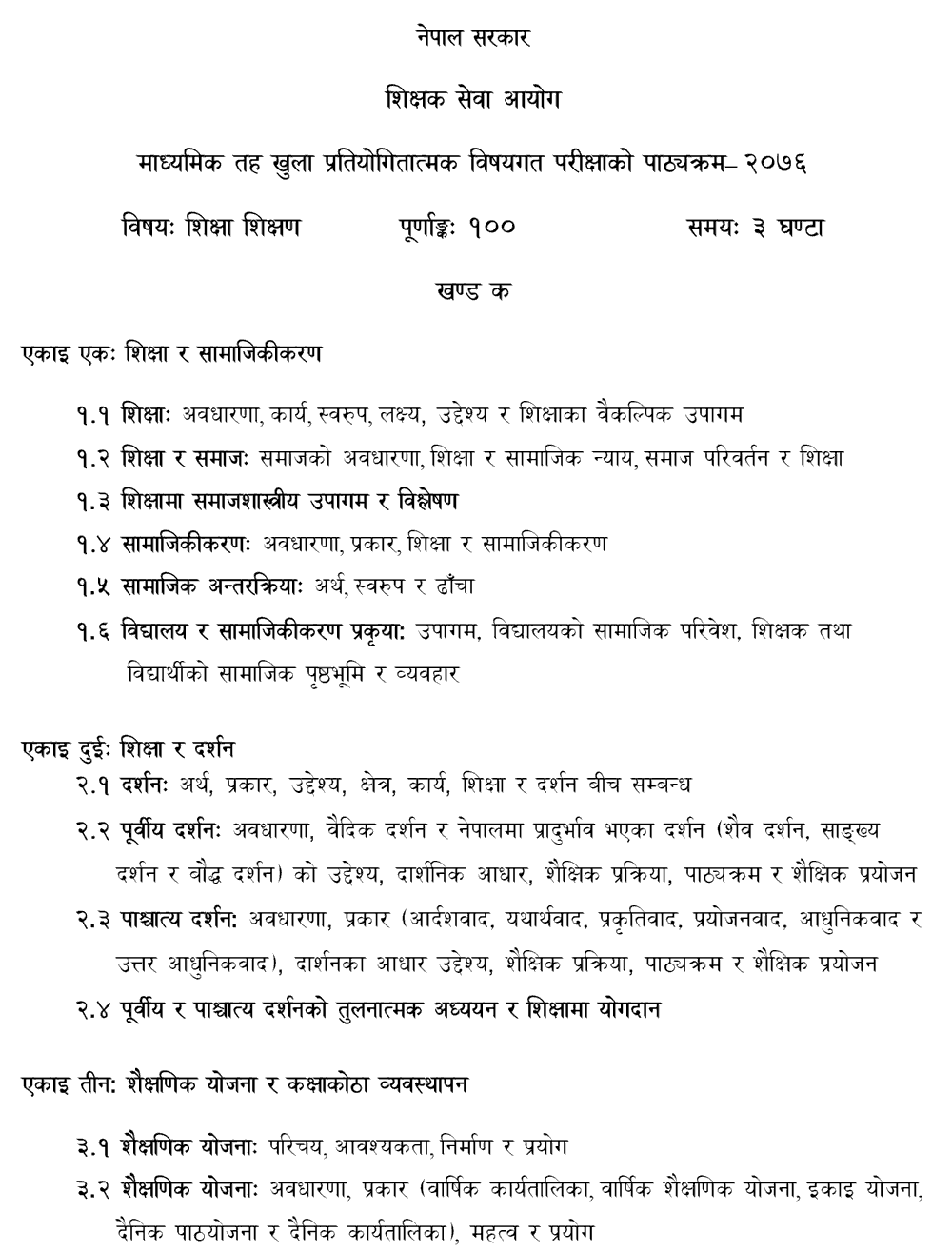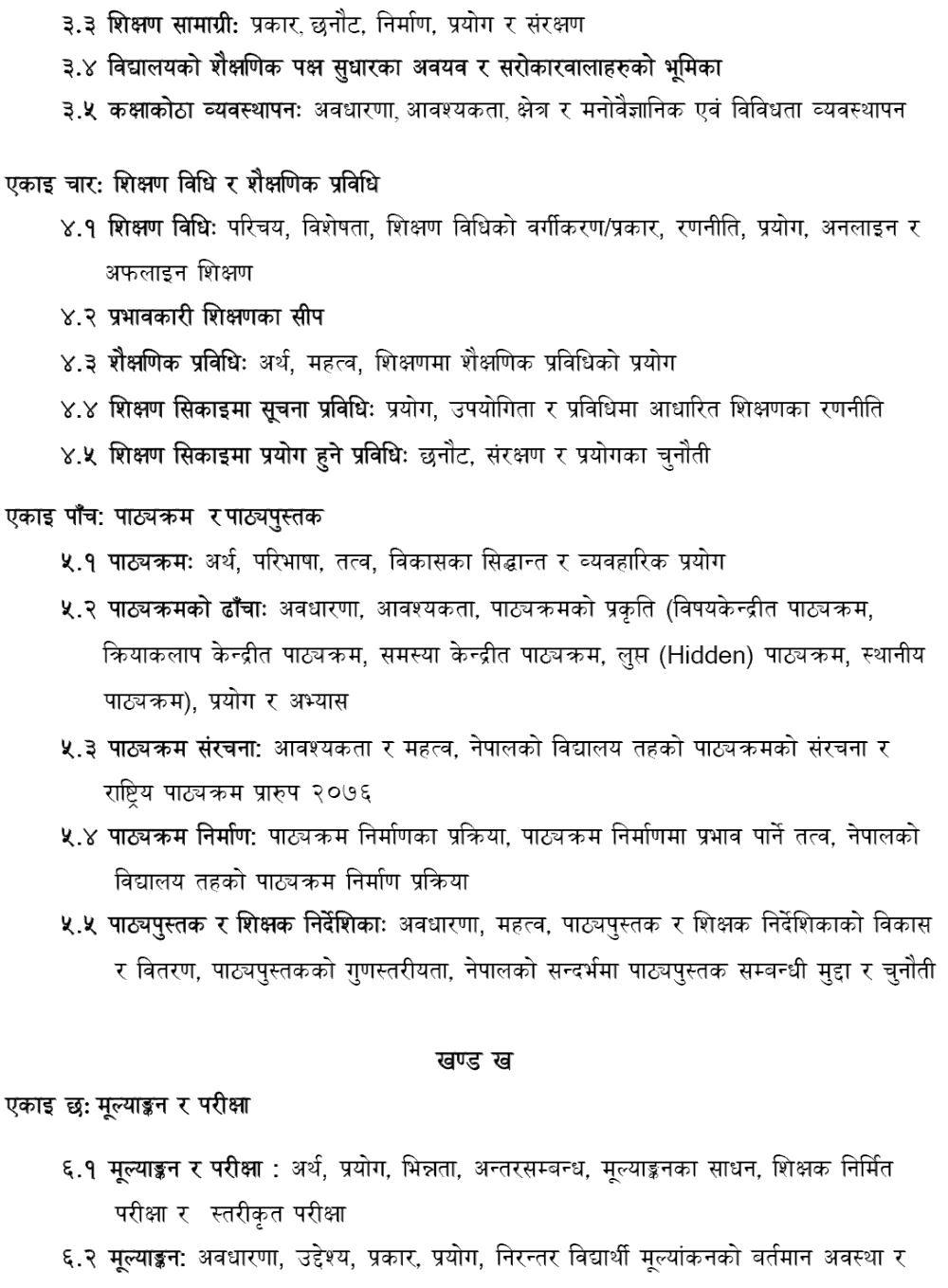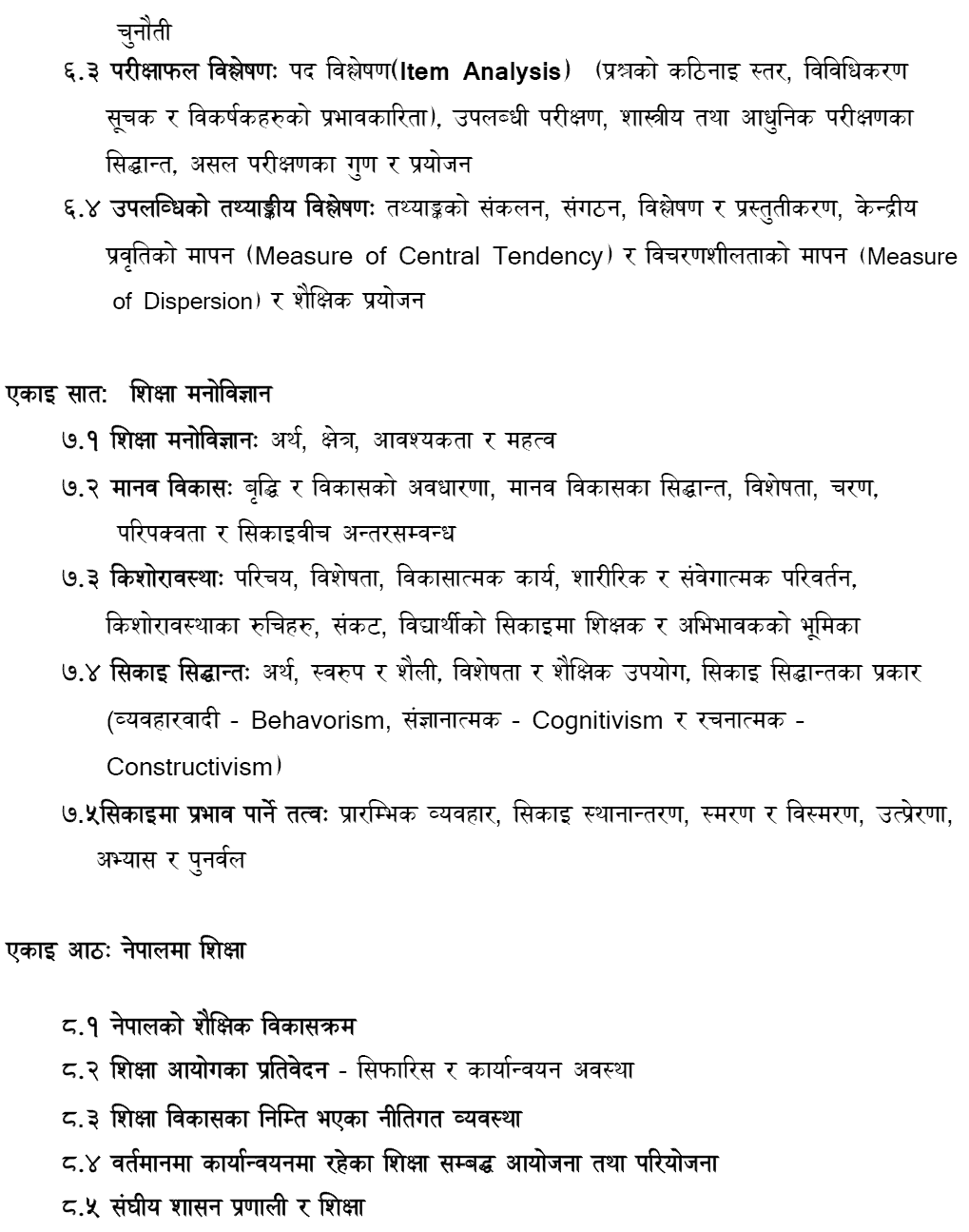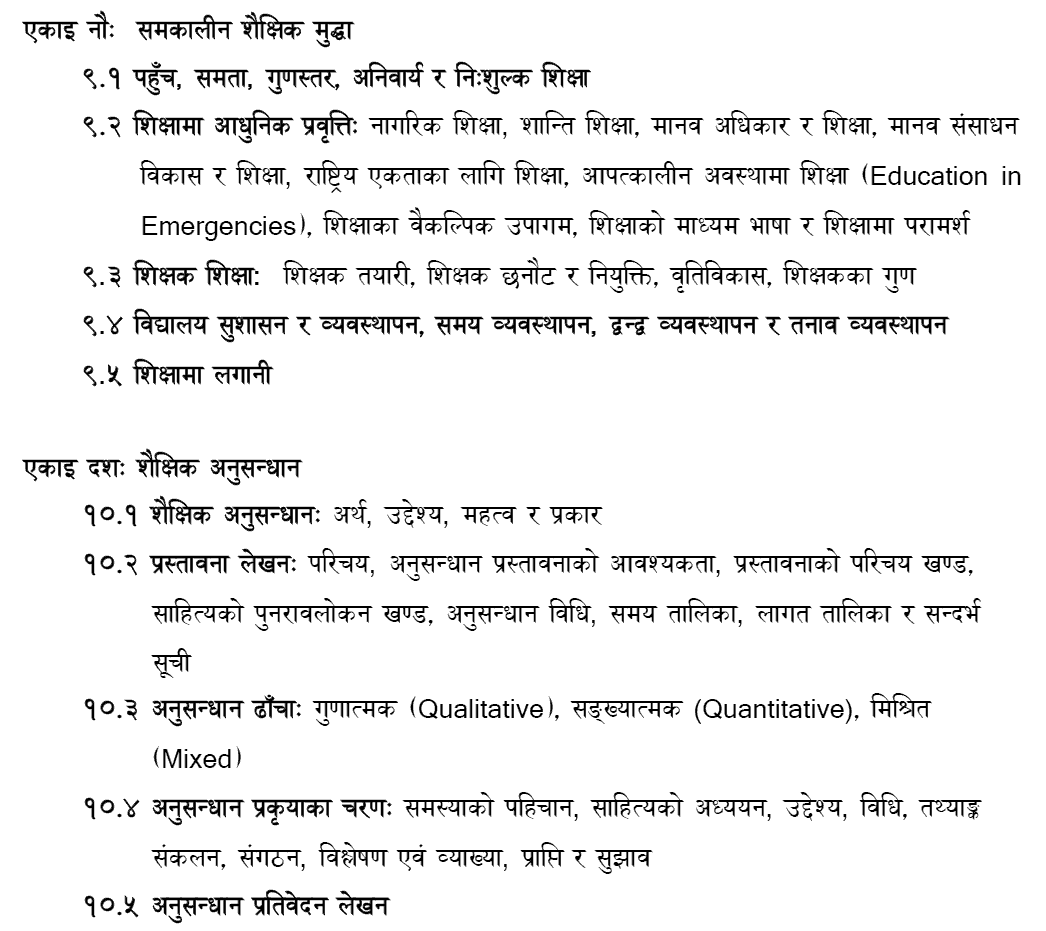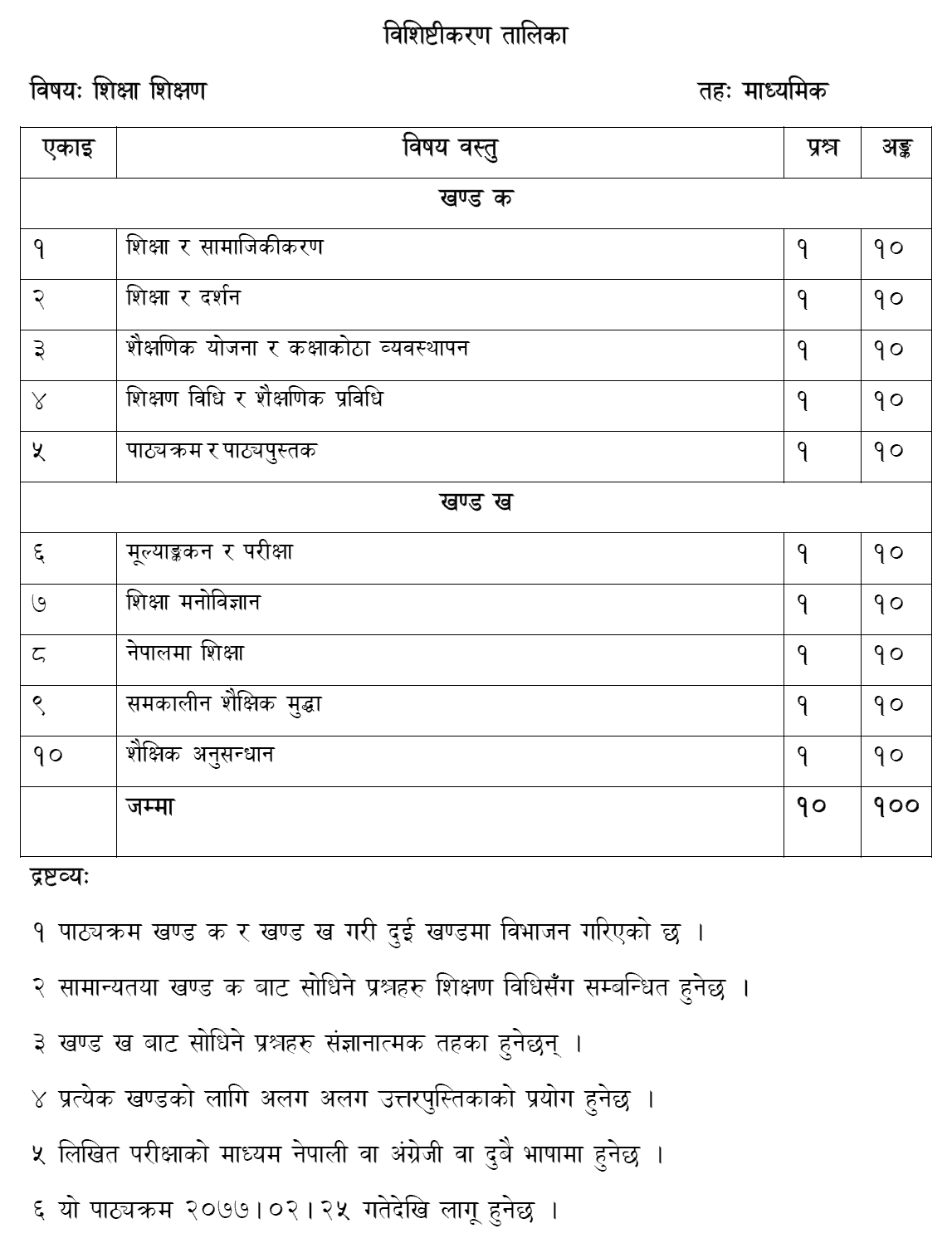
Education Teaching- Syllabus of Secondary Level Open Competitive Thematic Examination 2076:
Government of Nepal, Teacher Service Commission
Syllabus of Secondary Level Open Competitive Thematic Examination 2076
Subject: Education Teaching
Full Marks: 100, Time: 3 hours
Section - A
Unit One: Education and Socialization
1.1 Education: Concepts, functions, forms, goals, objectives and alternative approaches to education
1.2 Education and society: The concept of society, education and social justice, social change and education
1.3 Sociological approaches and analysis in education
1.4 Socialization: Concept, type, education, and socialization
1.5 Social Interaction: Meaning, Form, and Structure
1.6 School and Socialization Process: Approach, Social Environment of the School, Social Background and Behavior of Teachers and Students
Unit Two: Education and Philosophy
2.1 Philosophy: The relationship between meaning, type, purpose, field, function, education and philosophy
2.2 Eastern Philosophy: Concepts, Vedic Philosophy and Philosophy (Shaivite Philosophy, Sankhya Philosophy, and Buddhist Philosophy)
2.3 Western Philosophy: Concepts, Types (Idealism, Realism, Naturalism, Purposes, Modernism, and Postmodernism), Basic Objectives of Philosophy, Educational Process, Curriculum, and Educational Purpose
2.4 Contribution to the comparative study and teaching of Eastern and Western philosophy
Unit Three: Educational Planning and Classroom Management
3.1 Educational plan: introduction, need, construction and use
3.2 Educational Plan: Concepts, Types (Annual Schedule, Annual Educational Plan, Unit Plan, Daily Plan, and Daily Schedule), Significance and Use 3.3 Teaching materials: type, selection, manufacture, use, and protection
3.4 Components of school improvement and the role of stakeholders
3.5 Classroom Management: Concepts, Needs, Areas and Psychological and Diversity Management
Unit Four: Teaching Methods and Educational Technology
4.1 Teaching Methods: Introduction, Features, Classification / Types of Teaching Methods, Strategies, Uses, Online and Offline Teaching
4.2 Effective teaching skills
4.3 Educational Technology: Meaning, Importance, Use of Educational Technology in Teaching
4.4 Information Technology in Teaching-Learning: Teaching Strategies Based on Use, Utility and Technology
4.5 Techniques used in teaching and learning: Challenges of selection, conservation, and use
Unit Five: Curriculum and Textbook
5.1 Course: Meaning, Definition, Elements, Principles of Development and Practical Applications
5.2 Curriculum Framework: Concepts, Requirements, Nature of Curriculum (Subject Curriculum, Activity Curriculum, Problem Centered Curriculum, Missing (॥0061) Curriculum, Local Curriculum), Use and Practice
5.3 Curriculum Structure: Needs and Importance, Structure of Nepal's School Level Curriculum and National Curriculum Draft 2076
5.4 Curriculum Development: The process of curriculum development, the factors influencing curriculum development, Nepal's school level curriculum development process
5.5 Textbook and Teacher's Guide: Concept, Importance, Development and Distribution of Textbook and Teacher's Guide, Quality of Textbooks, Textbook Issues and Challenges in Nepal
Section - B
Unit Six: Evaluation and Examination
6.1 Evaluation and Examination: Meaning, Experiment, Difference, Interrelationship, Means of Evaluation, Teacher Made Examination and Standard Test
6.2 Assessment: Concept, Objectives, Types, Experiments, Current Status, and Challenges of Continuing Student Assessment
6.3 Exam Result Analysis: Item Analysis (Difficulty Level of Question, Effectiveness of Diversification Indicators and Repellents), Achievement Test, Principles of Classical and Modern Test, Properties and Purposes of Good Test
6.4 Statistical Analysis of Achievements: Collection, Organization, Analysis, and Presentation of Statistics, Measure of Central Tendency and Measure of Dispersion and Educational Purpose
Unit Seven: Educational Psychology
7.1 Educational Psychology: Meaning, field need, and importance
7.2 Human Development: Concepts of Combination and Development, Principles of Human Development, Characteristics, Stages, the interrelationship between maturity and learning
7.3 Adolescence: introduction, characteristics, developmental functions, physical and emotional changes,
Adolescent interests, crises, the role of teachers and parents in student learning
7.4 Learning Theory: Meaning, Form and Style, Characteristics and Educational Use, Types of Learning Theory (Behaviorism), Cognitivism and Constructivism
7.5 Effects on Learning: Early Behavior, Learning Transfer, Memory and Forgetfulness, Motivation, Practice, and Rehabilitation
Unit 7: Education in Nepal
8.1 Educational Development of Nepal
8.2 Report of the Education Commission - Recommendation and implementation status
8.3 Policy provisions for education development
8.4 Education related projects and projects currently being implemented
8.5 Federal Governance and Education
Unit Nine: Contemporary Educational Issues
9.1 Access, equality, quality, compulsory and free education
9.2 Modern Trends in Education: Civic Education, Peace Education, Human Rights, and Education, Human Resource Development and Education, Education for National Unity, Education in Emergencies, Alternative Approaches to Education, Language of Education and Counseling in Education
9.3 Teacher Education: Teacher Preparation, Teacher Selection, and Appointment, Professional Development, Teacher Qualities
9.4 School Good Governance and Management, Time Management, Conflict Management, and Stress Management
9.5 Investment in education
Unit Ten: Educational Research
10.1 Educational research: meaning, purpose, importance, and type
10.2 Preface Writing: Introduction, Requirement of Research Preface, Preface of Preface, Review Section of Literature, Research Method, Schedule, Cost Table and Reference List
10.3 Research Framework: Qualitative, Quantitative, Mixed
10.4 Stages of the research process: problem identification, study of literature, objectives, methods, data collection, organization, analysis, and interpretation, findings and suggestions
10.5 Research report writing
Specialization table
Subject: Education Teaching
Level: Secondary
Section-A (each question 10 Marks)
1. Education and socialization - 10
2. Education and philosophy - 10
3. Educational planning and classroom management - 10
4. Teaching methods and educational technology - 10
5. Courses and Textbooks - 10
Section - B (each question 10 Marks)
6. Evaluation and Examination - 10
7. Educational Psychology - 10
8. Education in Nepal - 10
9. Contemporary Educational Issues - 10
10. Educational Research – 10
Notes:
1. The curriculum is divided into two sections, section A and section B.
2. Generally, the questions asked from section A will be related to the teaching method.
The questions to be asked from section 3 B will be of the cognitive level.
4. A separate answer sheet will be used for each section.
5. The medium of written examination will be in Nepali or English or both languages.
6. This course will be implemented from 2077-02-25.





